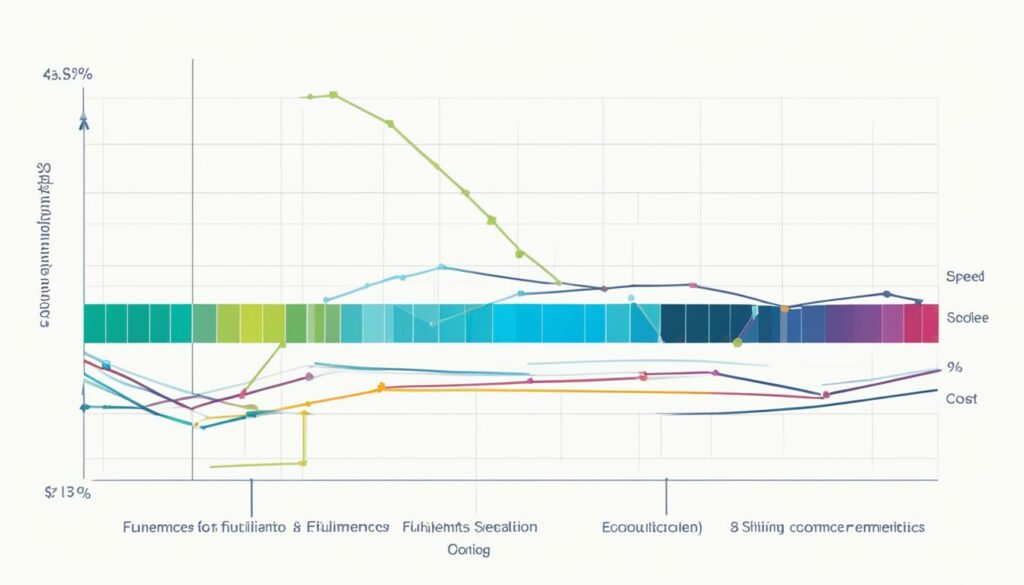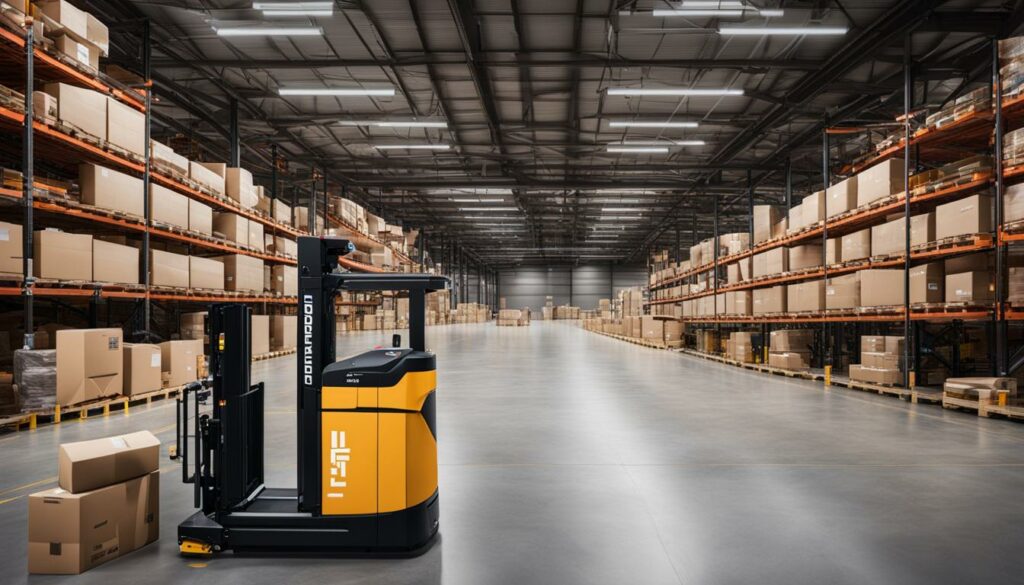Fulfillment in ecommerce refers to the processes involved in receiving, storing, picking, packing, and delivering products to customers. It is an essential part of the supply chain and plays a crucial role in ensuring customer satisfaction. Ecommerce fulfillment services, such as fulfillment centers, help businesses manage their order logistics efficiently. The importance of fulfillment in ecommerce cannot be understated, as it directly impacts customer experience, sales, and brand reputation. Implementing effective fulfillment strategies and working with reliable ecommerce fulfillment companies can bring numerous benefits to online retailers.
Key Takeaways:
- Fulfillment in ecommerce involves receiving, storing, picking, packing, and delivering products to customers.
- Ecommerce fulfillment services, such as fulfillment centers, help businesses manage their order logistics efficiently.
- Fulfillment plays a critical role in ensuring customer satisfaction, sales, and brand reputation.
- Implementing effective fulfillment strategies and working with reliable ecommerce fulfillment companies can benefit online retailers.
- Fulfillment in ecommerce is an essential part of the supply chain and impacts customer experience.
Fulfillment in ecommerce involves a series of processes that ensure products are delivered to customers in a timely and efficient manner. From receiving inventory and storing it in dedicated warehouses to picking and packing orders accurately, each step in the fulfillment process contributes to customer satisfaction. Ecommerce fulfillment services, such as specialized fulfillment centers, provide businesses with the infrastructure and expertise needed to handle their order logistics effectively. By partnering with reliable ecommerce fulfillment companies, online retailers can focus on other aspects of their business while ensuring seamless fulfillment operations.
Furthermore, the importance of fulfillment in ecommerce goes beyond customer satisfaction. It also directly impacts sales and brand reputation. Customers expect their orders to be delivered promptly and with the utmost care. Delayed shipments, inaccurately picked items, or poor packaging can result in negative experiences and damage the reputation of an online retailer. On the other hand, efficient and reliable fulfillment processes contribute to positive customer experiences, repeat purchases, and brand loyalty. By prioritizing fulfillment excellence, businesses can foster customer satisfaction, drive sales, and establish a strong brand presence in the competitive ecommerce landscape.
To optimize ecommerce fulfillment, it is crucial to employ effective strategies and work with reputable fulfillment partners. This includes leveraging technologies such as order management systems and warehouse management systems to enhance order accuracy and inventory visibility. Automating order management and integrating with ecommerce platforms can reduce manual errors and improve order processing speed. Streamlining warehouse operations through layout optimization and barcode scanning can enhance picking and packing efficiency. Additionally, partnering with reliable third-party logistics (3PL) providers can offer additional expertise and resources for seamless fulfillment operations.
Understanding Ecommerce Fulfillment: Definition and Processes
Ecommerce fulfillment encompasses the activities involved in receiving bulk goods, storing inventory in a warehouse, picking and packing orders, and delivering products to customers. It involves various processes that ensure smooth order fulfillment and customer satisfaction.
Ecommerce Warehousing
Ecommerce warehousing is a fundamental aspect of fulfillment. It involves storing products in dedicated spaces within a warehouse and organizing them efficiently for easy access during picking and packing. Proper inventory management and warehouse layout optimization are crucial to streamline fulfillment operations.
Picking and Packing Orders
Picking and packing is the process of selecting items from warehouse shelves and securely packaging them for shipment. It requires accurate item identification, attention to detail, and proper packaging techniques to ensure that products reach customers in optimal condition.
Order Delivery
Order delivery is the final step in ecommerce fulfillment, where products are shipped to customers. It involves working with shipping carriers to ensure prompt and reliable delivery. Tracking packages and providing customers with updated delivery information contribute to a positive customer experience.
Managing Returns
Managing returns is an essential part of ecommerce fulfillment. It includes processing returns, handling damaged or unwanted items, and managing restocking or refund processes. Streamlining the returns management process helps maintain customer satisfaction and can contribute to repeat purchases.
| Key Processes | Description |
|---|---|
| Ecommerce Warehousing | Storing inventory in a dedicated warehouse space and organizing it efficiently for order fulfillment. |
| Picking and Packing Orders | Accurately selecting items from shelves and securely packaging them for shipment. |
| Order Delivery | Working with shipping carriers to ensure prompt and reliable delivery to customers. |
| Managing Returns | Processing returns, handling damaged or unwanted items, and managing restocking or refund processes. |
Calculations and Metrics in Ecommerce Fulfillment
Calculations and metrics are essential tools for evaluating the performance of ecommerce fulfillment processes. By measuring key performance indicators (KPIs) such as order accuracy, shipping speed, inventory turnover, and return rate, businesses can gain valuable insights into the efficiency and effectiveness of their fulfillment operations.
Accurate calculations enable businesses to make data-driven decisions and optimize their ecommerce fulfillment strategies for better customer satisfaction and business success. Let’s take a closer look at some of the key metrics and their significance:
1. Order Accuracy
Order accuracy is a crucial metric that measures the percentage of accurately fulfilled orders. It reflects the precision and attention to detail in the picking and packing processes, ensuring that customers receive the correct items without any errors or discrepancies. High order accuracy demonstrates operational excellence and contributes to customer satisfaction and loyalty.
2. Shipping Speed
Shipping speed measures the time it takes for orders to reach customers. Fast and reliable order delivery is vital for meeting customer expectations and maintaining a competitive edge in the ecommerce market. Tracking shipping speed metrics helps identify areas for improvement, whether it’s optimizing transportation logistics or streamlining order processing and fulfillment to reduce delivery times.
3. Inventory Turnover
Inventory turnover indicates how quickly a company sells its inventory within a specific timeframe. Efficient inventory turnover ensures that products are not sitting in the warehouse for extended periods, reducing carrying costs and the risk of obsolescence. By monitoring inventory turnover, businesses can optimize their inventory management strategies to maintain a healthy balance between supply and demand.
4. Return Rate
The return rate measures the percentage of products returned by customers. It provides insights into customer satisfaction, product quality, and the effectiveness of the returns management process. A high return rate may indicate issues with product descriptions, sizing, or fulfillment accuracy, highlighting areas that require attention and improvement.
Monitoring these metrics allows businesses to identify trends, set benchmarks, and compare performance across different periods or locations. It enables data-backed decision-making to enhance operational efficiency, customer satisfaction, and overall profitability.
| Metric | Definition | Importance |
|---|---|---|
| Order Accuracy | Percentage of accurately fulfilled orders | Reflects precision and attention to detail, contributes to customer satisfaction and loyalty |
| Shipping Speed | Time taken for orders to reach customers | Meets customer expectations, maintains competitive edge |
| Inventory Turnover | Rate at which inventory is sold | Optimizes inventory management, reduces carrying costs and obsolescence |
| Return Rate | Percentage of products returned by customers | Indicates customer satisfaction, product quality, and effectiveness of returns management |

Importance of Fulfillment in Ecommerce: Customer Satisfaction and Business Growth
Fulfillment in ecommerce is of utmost importance as it directly impacts customer satisfaction and drives business growth. The success of an ecommerce business is heavily reliant on the ability to deliver products promptly and accurately to customers, ensuring their satisfaction throughout the entire shopping experience.
Customer satisfaction plays a pivotal role in the success of an ecommerce venture. When customers receive their orders on time and in good condition, they are more likely to have a positive perception of the brand and develop a sense of loyalty. Satisfied customers are more likely to return for future purchases and recommend the brand to others, contributing to increased customer retention and organic growth.
Providing an exceptional fulfillment experience not only leads to customer satisfaction but also helps build a strong brand reputation. When customers receive their orders promptly and experience hassle-free returns, they are more likely to view the brand as trustworthy and reliable, enhancing the brand’s overall reputation in the ecommerce market.
Conversely, poor fulfillment practices can have detrimental effects on customer satisfaction, leading to negative reviews, customer churn, and a damaged brand reputation. Delays in order fulfillment, shipping errors, and inadequate packaging can leave customers dissatisfied and prompt them to seek alternative options from competitors.
To ensure customer satisfaction and drive business growth, ecommerce businesses must prioritize fulfillment excellence. By investing in efficient fulfillment processes, such as streamlined warehouse operations, automated order management systems, and reliable shipping partners, businesses can enhance the overall customer experience and foster long-term customer loyalty.
Benefits of Fulfillment Excellence:
- Enhanced customer satisfaction and loyalty
- Increased customer retention and repeat purchases
- Positive brand reputation and word-of-mouth referrals
- Competitive advantage in the ecommerce market
- Improved conversion rates and revenue
By recognizing the importance of fulfillment in ecommerce, businesses can optimize their fulfillment processes, meet customer expectations, and establish a strong foundation for sustained growth and success.

Strategies to Improve Ecommerce Fulfillment
Optimizing ecommerce fulfillment processes is essential for businesses to meet customer expectations and drive growth. By implementing the right strategies, ecommerce retailers can streamline operations, enhance order accuracy, and improve customer satisfaction. Here are some key strategies to improve ecommerce fulfillment:
1. Optimize Fulfillment Processes
Identify bottlenecks in your fulfillment processes and implement efficient workflows. Streamline order picking, packing, and shipping to minimize errors and delays. Regularly review and improve your processes to ensure maximum efficiency.
2. Invest in Technology
Utilize order management systems and warehouse management systems to optimize inventory visibility and automate order processing. By adopting technology solutions, you can reduce manual errors, improve order accuracy, and enhance overall efficiency.
3. Automate Order Management
Integrate your ecommerce platform with an automated order management system to streamline the order fulfillment process. Automated systems can help manage order processing, inventory updates, and customer communication, reducing the risk of errors and delays.
4. Streamline Warehouse Operations
Optimize your warehouse layout for efficient product storage and order fulfillment. Utilize barcode scanning technology to improve picking and packing accuracy. Regularly review your warehouse processes to identify areas for improvement and implement changes accordingly.
5. Enhance Inventory Visibility
Implement inventory management systems that provide real-time visibility into stock levels, product availability, and order status. Accurate inventory visibility helps prevent stockouts, eliminates overselling, and ensures timely order fulfillment.
6. Partner with Reliable 3PL Providers
Consider collaborating with reputable third-party logistics (3PL) providers. 3PL providers bring expertise, resources, and scalable infrastructure to optimize your fulfillment operations. By outsourcing certain aspects of fulfillment, you can focus on core business activities and ensure reliable and efficient order fulfillment.
By implementing these strategies and continuously refining your ecommerce fulfillment processes, you can enhance customer satisfaction, improve operational efficiency, and drive business growth.

Understanding Customer Behavior in Relation to Ecommerce Fulfillment
Customer behavior plays a significant role in ecommerce fulfillment. By understanding customer preferences in order delivery, ecommerce businesses can provide a positive and satisfying experience for their customers. Several factors influence customer satisfaction, including shipping options, delivery speed, order tracking, and return policies.
- Shipping options: Offering a variety of shipping options allows customers to choose the most convenient and suitable method for their needs. Whether it’s standard shipping, express delivery, or same-day shipping, providing options caters to different customer preferences.
- Delivery speed: Customers value prompt delivery. The speed at which orders are fulfilled and delivered influences their overall satisfaction. Providing expedited or fast delivery options can meet the needs of customers who require quicker shipping.
- Order tracking: Keeping customers informed about the status of their orders is crucial for transparency and peace of mind. Providing accurate and up-to-date order tracking information allows customers to track their shipments and anticipate the delivery date.
- Return policies: Easy and hassle-free return policies contribute to customer trust and satisfaction. Customers appreciate the ability to return products easily in case they are not satisfied with their purchases or encounter any issues.
By considering customer behavior and preferences, ecommerce businesses can tailor their fulfillment processes to meet specific expectations. Providing a seamless and customer-centric shopping experience enhances customer satisfaction, builds trust, and fosters long-term relationships.
“Understanding customer behavior in ecommerce fulfillment is crucial for providing a positive and satisfying experience for customers.”
The Impact of Customer Behavior on Ecommerce Fulfillment
Customer behavior directly affects all stages of the ecommerce fulfillment process. Knowing what customers expect and prefer helps businesses optimize their operations accordingly.
For example, understanding that customers prioritize fast delivery may lead businesses to prioritize shipping carrier partnerships that specialize in speedy delivery. Alternatively, if customers value order tracking, businesses can prioritize investing in technology that provides accurate and real-time tracking updates.
Aligning ecommerce fulfillment with customer behavior not only improves customer satisfaction but also increases the likelihood of repeat purchases and positive word-of-mouth referrals.
Relation of Ecommerce Fulfillment to Other Ecommerce Metrics
Ecommerce fulfillment is a crucial aspect of the ecommerce ecosystem and is closely intertwined with various metrics that determine the success of online businesses. The efficiency and effectiveness of fulfillment processes have a direct impact on key metrics such as customer acquisition cost, customer lifetime value, average order value, and conversion rate.
“Effective fulfillment processes contribute to cost savings in customer acquisition by ensuring smooth and satisfactory order fulfillment experiences.”
When ecommerce fulfillment is executed seamlessly, it creates a positive customer experience that leads to customer satisfaction and repeat purchases, which in turn drives higher customer lifetime value.
“Customer satisfaction and loyalty resulting from excellent fulfillment practices can significantly impact customer lifetime value.”
Furthermore, optimizing fulfillment processes can enhance the average order value, encouraging customers to purchase more items with each transaction.
In summary, the relationship between ecommerce fulfillment and other metrics is as follows:
- Ecommerce fulfillment and customer acquisition cost: Efficient fulfillment processes contribute to cost savings in customer acquisition by ensuring smooth and satisfactory order fulfillment experiences.
- Ecommerce fulfillment and customer lifetime value: Excellent fulfillment practices drive customer satisfaction and loyalty, leading to higher customer lifetime value.
- Ecommerce fulfillment and average order value: Optimized fulfillment processes can enhance the average order value by encouraging customers to purchase more items.
- Ecommerce fulfillment and conversion rate: A seamless fulfillment experience reduces friction and meets customer expectations, ultimately leading to a higher conversion rate.
By recognizing the interplay between ecommerce fulfillment and these key metrics, businesses can leverage effective fulfillment strategies to drive growth and success in the competitive world of ecommerce.
The Relationship between Ecommerce Fulfillment and Metrics
| Metric | Relationship with Ecommerce Fulfillment |
|——————————–|——————————————————————-|
| Customer Acquisition Cost | Efficient fulfillment reduces customer acquisition expenses. |
| Customer Lifetime Value | Excellent fulfillment practices lead to higher customer value. |
| Average Order Value | Optimized fulfillment processes can increase average order value. |
| Conversion Rate | Seamless fulfillment improves conversion rates. |
Image: Ecommerce fulfillment is closely related to various metrics in the ecommerce ecosystem.
Challenges and Considerations in Ecommerce Fulfillment
Ecommerce fulfillment poses several challenges that businesses must navigate to ensure smooth operations and customer satisfaction. One of the key challenges is scalability, as businesses must be prepared to handle increased order volumes during peak periods. This requires optimizing warehouse space, streamlining processes, and working closely with fulfillment partners to ensure timely order processing and delivery.
Another challenge in ecommerce fulfillment lies in inventory management complexities. Accurately forecasting demand, managing stock levels, and preventing stockouts or overstock situations are critical considerations. Implementing robust inventory management systems and utilizing data-driven insights can help businesses optimize their inventory management and ensure efficient order fulfillment.
International shipping introduces a unique set of challenges in ecommerce fulfillment. Customs regulations, duties, and longer delivery times can impact shipping costs, customer expectations, and overall fulfillment operations. Businesses must navigate these complexities by partnering with reliable shipping carriers, understanding international trade regulations, and providing transparent communication with customers regarding potential delays or additional charges.
Returns processing is another challenge that ecommerce businesses must address. Managing returned items, restocking inventory, and assessing the condition of returned products require efficient processes and dedicated resources. Establishing clear and customer-friendly return policies, optimizing reverse logistics, and leveraging technology solutions can help streamline returns processing and minimize the impact on fulfillment operations.
Finally, integrating technology systems and processes is crucial for smooth order management and fulfillment operations. However, it can be challenging to integrate various platforms, such as ecommerce platforms, inventory management systems, and order management systems. Businesses must carefully evaluate their technology needs, choose scalable and compatible solutions, and invest in regular training and support to ensure seamless technology integration and optimal efficiency.
FAQ
What is fulfillment in ecommerce?
Fulfillment in ecommerce refers to the processes involved in receiving, storing, picking, packing, and delivering products to customers.
What are ecommerce fulfillment services?
Ecommerce fulfillment services, such as fulfillment centers, help businesses manage their order logistics efficiently.
What are the importance and benefits of fulfillment in ecommerce?
Fulfillment in ecommerce is crucial for ensuring customer satisfaction, driving sales, and maintaining a positive brand reputation. It leads to increased customer loyalty and repeat purchases.
What are the essential processes involved in ecommerce fulfillment?
Ecommerce fulfillment encompasses activities such as ecommerce warehousing, picking and packing orders, order delivery, and managing returns.
What metrics are important in evaluating ecommerce fulfillment performance?
Key performance indicators (KPIs) such as order accuracy, shipping speed, inventory turnover, and return rate provide insights into the efficiency and effectiveness of ecommerce fulfillment operations.
How does ecommerce fulfillment impact customer satisfaction and business growth?
By ensuring prompt and accurate order fulfillment, ecommerce fulfillment plays a crucial role in enhancing customer satisfaction, driving customer loyalty, and contributing to overall business growth.
What strategies can be implemented to improve ecommerce fulfillment?
Businesses can optimize fulfillment processes, invest in technology, automate order management, streamline warehouse operations, enhance inventory visibility, and partner with reliable 3PL providers to improve ecommerce fulfillment.
How does customer behavior influence ecommerce fulfillment?
Understanding customer preferences in order delivery, including shipping options, delivery speed, order tracking, and return policies, is crucial for providing a positive shopping experience and enhancing ecommerce fulfillment.
How does ecommerce fulfillment relate to other ecommerce metrics?
Efficient ecommerce fulfillment can impact metrics such as customer acquisition cost, customer lifetime value, average order value, and conversion rate.
What are the challenges and considerations in ecommerce fulfillment?
Ecommerce fulfillment poses challenges such as scalability, inventory management complexities, international shipping, returns processing, and technology integration, which businesses need to navigate for successful fulfillment.
